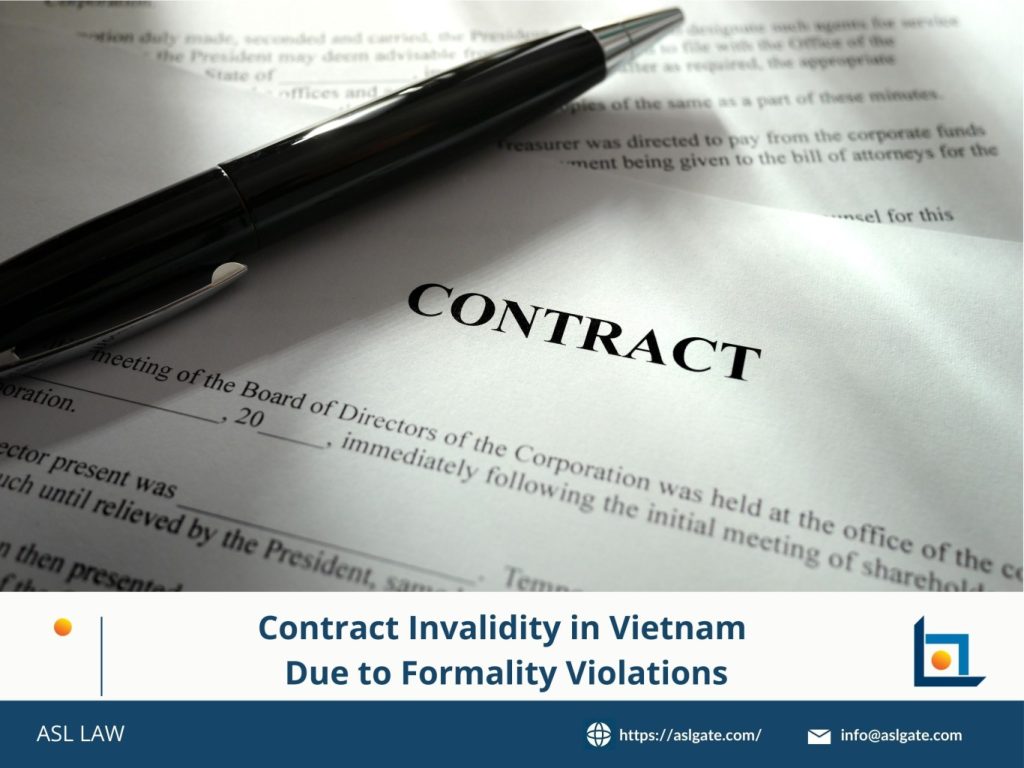In civil and commercial transactions, contracts play a crucial role in establishing, modifying, or terminating rights and obligations between parties. However, for a contract to have legal validity, it must not only meet substantive and competency requirements but also comply with formal requirements as prescribed by law.
In Vietnam, violations of formal requirements can lead to severe legal consequences, including the potential invalidation of the contract. This article analyzes the legal provisions related to contract invalidity due to formality violations, clarifying specific cases, legal consequences, and practical applications.
Legal Provisions on Contract Formality
According to Article 119 of the 2015 Civil Code, contracts can be expressed orally, in writing, or through specific conduct demonstrating the parties’ intent. Depending on the nature of the transaction, the law may require contracts to be in writing, notarized, authenticated, or registered with a competent authority.
For certain important contracts, such as sales contracts (Article 430 of the 2015 Civil Code), asset exchange contracts (Article 455), or contracts related to land use rights (Article 500), the law mandates that they be in writing and comply with notarization, authentication, or registration procedures.
Additionally, transactions conducted via electronic means are considered written contracts if they meet the formality requirements under the Law on Electronic Transactions.
When is a Contract Invalidity Due to Formality Violations?
According to Clause 1, Article 407 of the 2015 Civil Code, a contract may be declared invalid if the law mandates a written form and the parties fail to comply.
However, there are exceptions. Specifically, if a contract violates formal requirements but at least two-thirds of its obligations have been performed, the court may, at the request of one party, recognize its validity (Article 129 of the 2015 Civil Code).
This provision protects the interests of parties when a contract has been substantially performed without significant disputes, despite minor formality deficiencies.
Legal Consequences of Contract Invalidity Due to Formality Violations
According to Article 131 of the 2015 Civil Code, when a contract is declared invalid:
- The parties must restore the original state and return what they have received.
- If physical restitution is not possible, an equivalent value must be refunded.
- The party at fault must compensate for any damages caused.
- A good-faith party who has gained benefits (e.g., profits, yields) is not required to return them.
These provisions ensure fairness in transactions and mitigate unnecessary losses arising from contract invalidation.
Conclusion
Contracts that fail to comply with formal requirements may be declared invalid. However, if a significant portion of the contract has already been fulfilled, courts may recognize its validity. Therefore, parties should strictly adhere to legal formalities when entering contracts to avoid legal risks.
ASL Law is a leading full-service and independent Vietnamese law firm made up of experienced and talented lawyers. ASL Law is ranked as the top tier Law Firm in Vietnam by Legal500, Asia Law, WTR, and Asia Business Law Journal. Based in both Hanoi and Ho Chi Minh City in Vietnam, the firm’s main purpose is to provide the most practical, efficient and lawful advice to its domestic and international clients. If we can be of assistance, please email to [email protected].
ASL LAW is the top-tier Vietnam law firm for Contract Reviewing and Drafting. If you need any advice, please contact us for further information or collaboration.

 Tiếng Việt
Tiếng Việt 中文 (中国)
中文 (中国) 日本語
日本語

